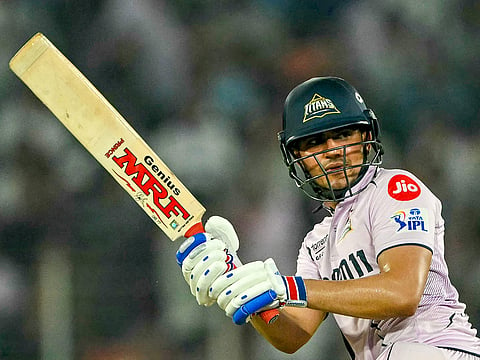Prince no more: Shubman Gill steps into the arena as India’s new Test captain
He has the shots, the stats, and now the stripes to guide Men in Blue in new era

Dubai: It wasn’t long ago that Shubman Gill was spoken of in whispers — the “next big thing”, the “prince in waiting”. But with Rohit Sharma and Virat Kohli putting an end to their illustrious careers, Gill now walks out not just as India’s premier young batter but as the new Test captain. And he does so with more than just promise on his side.
Tactical clarity and purple patch
Gill’s appointment isn’t a surprise; it’s the result of a carefully laid path. The selectors had signalled their intent by naming him Rohit’s deputy for the Champions Trophy. He responded with a commanding tournament, helping India reclaim the title in Dubai.
Then came the real test — the IPL — where Gill, leading Gujarat Titans in only his second season, combined tactical clarity with a purple patch at the top of the order. His unbeaten 93 in the Titans’ playoff-clinching win last week, taking his tally to 636 runs at 57.81, felt like the final seal on a growing case.
Yet, Gill is quick to separate the leader from the batter.
“I have talked about this a couple of times — when I’m batting, I want to play and think as a batsman, not as a captain,” he said recently. “At the back end last season, I learnt that.”
It’s a statement that reflects not just maturity, but an understanding of leadership many take years to find. While the weight of captaincy has consumed many talents in Indian cricket, Gill seems intent on avoiding that trap. His poise has impressed players and pundits alike — even if he’d rather not be called ‘Prince’ anymore.
“Let Shubman Gill remain Shubman Gill instead of calling him a ‘Prince’,” Gujarat’s assistant coach Parthiv Patel said. “He is leading from the front and makes his presence felt in the dressing room. He doesn’t talk much, but his words carry a lot of weight.”
A natural transition
Gill’s elevation is as much about circumstance as it is about substance. Jasprit Bumrah, India’s vice-captain in Australia, was a strong candidate. But recurring injuries — including the stress fracture that ruled him out of the Champions Trophy — made the selectors wary of building a team around a player whose workload needs constant management.
Virat Kohli, the architect of India’s aggressive modern Test identity, has ruled himself out of captaincy conversations. Rishabh Pant and KL Rahul remain contenders, but for now, the torch has been passed to a younger, more durable presence.
“Gill is a classy player. There was never a doubt about his ability in this squad,” said Rohit Sharma ahead of the Champions Trophy. “There is a reason he was elevated as vice-captain. Hopefully, he has a great tournament, and it helps us achieve the things we’re looking to achieve.”
What sets Gill apart?
Sunil Gavaskar believes it’s Gill’s competitive edge that separates him from his peers. “When you look at Gill, Iyer and Pant… you see a mix of different qualities,” Gavaskar said. “Gill seems the most competitive. When there’s a close call, he’s quick to question the umpire. He’s very involved in the game.”
That involvement has already translated to results. Taking over from Hardik Pandya after his move to Mumbai Indians, Gill led Gujarat Titans to a playoff berth in a fiercely competitive IPL season. His leadership was measured and unflustered — a quality that stood out in pressure moments.
“Shubman has a very bright future as a leader,” said vice-captain Rashid Khan. “Not just as a batter, but in the way he thinks and understands the game. He comes with a plan. He’s calm and manages the environment really well.”
A legacy to uphold
There’s no question that Gill has big boots to fill. Rohit Sharma won 12 of his 24 Tests as captain, including key series victories at home. But it’s Kohli’s shadow that looms largest — 40 wins from 68 matches, and a team that redefined India’s Test identity overseas.
Gill has already shown sparks of that same ambition. He became only the fifth Indian batter — alongside Rohit and Kohli — to score centuries in all three formats. And yet, questions linger about his consistency in the longest format. His Test average outside India, just 29.50 from 13 matches, is an area he’ll have to address quickly — especially with five Tests in England coming up.
He knows where the credit lies for his ascent. “I think the way I practise and the way my dad made me practise… 90 per cent of the credit should go to him,” Gill has said. “It was his vision.”
That vision — forged in the farmlands of Punjab — has now carried him to the peak of Indian cricket.
What next?
India’s five-Test series in England, starting June 20, will mark the beginning of a new WTC cycle — and a new era. With Kohli expected to bat at No. 4 and no Rohit at the top, Gill will not just be leading India for the first time in Tests, he’ll also be doing so with a young side in transition.
He will have Rishabh Pant, Shreyas Iyer, Yashasvi Jaiswal, and perhaps even Sarfaraz Khan for company. But the mantle — and the scrutiny — is his alone.
Is he ready?
The stats, the steel, and the silence in his swagger all point to one answer: he already is.
Sign up for the Daily Briefing
Get the latest news and updates straight to your inbox







